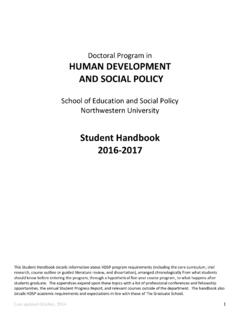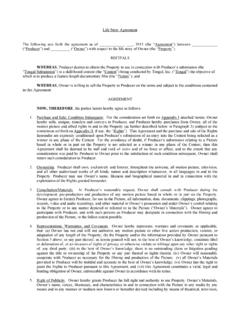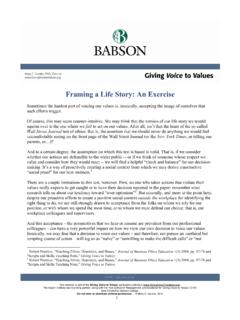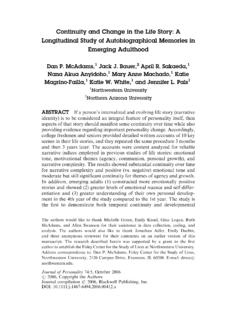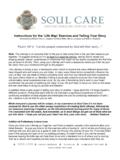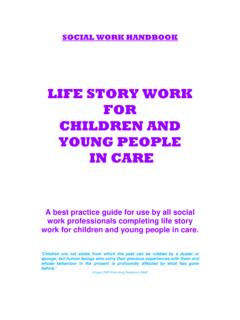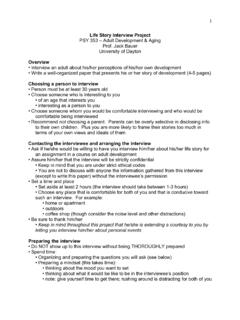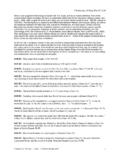Transcription of Personality and the coherence of psychotherapy narratives
1 Personality and the coherenceof psychotherapy narrativesJonathan M. Adlera,*, Joshua W. Wagnera, Dan P. McAdamsa,baDepartment of Psychology, Northwestern University, 2120 Campus Drive,Annenberg Hall 214, Evanston, IL 60208, USAbDepartment of Human Development and Social Policy, Northwestern University, USAA vailable online 6 March 2007 AbstractThe stories people construct about themselves and their social worlds are key aspects of theiridentities [Bruner, J. S. (1990).Acts of meaning. Cambridge, MA: Harvard University Press; McAd-ams, D. P. (2001). The psychology of life of General Psychology,5, 100 122].
2 Whereascertain expected life experiences ( , leaving home, getting a job) may be relatively easy to narrate,more unexpected and difficult events, such as undergoing psychotherapy , may pose a challenge tosuccessful narration. Yet it is especially important to successfully narrate one s experience in psycho-therapy in order to maintain the gains from treatment [Frank, J. D. (1961).Persuasion and healing:A comprehensive study of psychotherapy . Baltimore, MD: Johns Hopkins University Press; Spence,D. P. (1982).Narrative truth and historical truth: Meaning and interpretation in York: Norton].
3 The present study collected psychotherapy narratives from 76 adult for-mer clients and coded them for the fundamental story criterion of coherence [Baerger, D. R., &McAdams, D. P. (1999). life story coherence and its relation to psychological ,9, 69 96]. Former clients that were high in trait Openness to experience and those at higherstages of ego development told more coherent stories about therapy. The relationship between egodevelopment and narrative coherence remained significant even when controlling for Openness. Thefindings suggest that high ego development may provide narrators with the kind of sophisticatedframeworks for meaning-making that are especially well-suited for the important task of makinggood sense of psychotherapy .
4 2007 Elsevier Inc. All rights :Narrative; coherence ; psychotherapy ; Ego development; Openness0092-6566/$ - see front matter 2007 Elsevier Inc. All rights *Corresponding author. Fax: +1 847 491 Adler).Available online at of Research in Personality 41 (2007) 1179 IntroductionA growing number of researchers and theorists in psychology today conceive of humanidentity innarrativeterms (McAdams, 2001; McAdams, Josselson, & Lieblich, 2006;Singer, 2005). According to these views, human beings are storytellers by nature, andthe stories they tell about themselves and their social worlds form key aspects of their iden-tities (Bruner, 1990; Pasupathi, 2001).
5 The internalized and evolving stories people con-struct about their lives function to integrate diverse experiences and provide people slives with some degree of unity and purpose ( ,McAdams, 2001).Certain life experiences are relatively easy to narrate and fit smoothly into the person songoing story of self. Events such as leaving one s parents home, getting a job, and preg-nancy are milestones that occur in many people s lives and most people are familiar withcommon cultural stories about these types of occasions. Adolescents and young adultsmay imagine these events in their future and form stories or scripts about how they imag-ine they will unfold (Elkind, 1981; Habermas & Bluck, 2000).
6 By contrast, other experiences pose a significant challenge to successful narration. Theymay be unexpected or difficult and are rarely to be found in people s imagined futurescripts. When these events do occur they resist easy incorporation into one s narrativeidentity, for the individual is posed with the often daunting task of constructing a storyabout them in order to render them meaningful. As a result, the individual is faced withsignificantly revising his or her existing self- story . The experience of having been in psy-chotherapy is a good example of one of these particularly challenging episodes.
7 Goingto therapy is typically an emotionally laden event that is not commonly a part of people simagined future scripts. Indeed, idealized stories about living a good life typically donotcontain chapters wherein the protagonist enters psychotherapy (McAdams, 2006a). None-theless, when people have been in psychotherapy , the experience often stands out as espe-cially significant. Indeed, in an investigation of people s life stories,Lieblich (2004)foundthat her participants spontaneously brought up their experiences of psychotherapy whenrecounting their lives and often referred to these experiences as key sites of their develop-ment.
8 The crafting of a viable personal narrative about the psychotherapeutic experiencewould therefore seem to be an important identity challenge. This is an idea with a longtheoretical tradition. Indeed, in his classic book on psychotherapy ,Persuasion and Heal-ing,Frank (1961)suggested that the storying of psychotherapy weaving the myth ofthe therapeutic experience is fundamental to the individual s continued optimal func-tioning once treatment has ended (p. 327).Spence (1982)echoed this sentiment suggestingthat the therapeutic narrative may also maintain its structure over time and enable thepatient to better retain what he [sic] learned during the analysis (p.)
9 270).From this perspective, carrying forward a successful story of one s psychotherapy sup-ports the maintenance of the gains from treatment. In addition, a large body of researchon clients experiences of psychotherapy ( ,Adler & McAdams, 2007a; Adler &McAdams, 2007b; Angus & McLeod, 2004; Elliott & James, 1989; Howard, 1991) suggeststhat clients narrate these experiences in reliably different ways. Finally, there is a growinginterest in the intersection of Personality and psychotherapy that emphasizes the centralrole of narrative in explicating this relationship ( ,Adler & McAdams, 2007a, 2007b;Angus & McLeod, 2004; Singer, 2005).
10 life -narrative research shows that people s stories about their lives differ substantiallyand that people vary a great deal in their abilities to narrate good or satisfying Adler et al. / Journal of Research in Personality 41 (2007) 1179 1198about personal experiences (McAdams, 2001, 2006a; Thorne, 2000). For example, life -nar-rative accounts that contain many scenes of overcoming adversity and finding redemptionfrom suffering (McAdams, Reynolds, Lewis, Patten, & Bowman, 2001), that anticipatehappy endings and a sense of closure (King, Scollon, Ramsey, & Williams, 2000), and thatemphasize intrinsically motivated life strivings (Bauer & McAdams, 2004a; Bauer, McAd-ams, & Sakaeda, 2005) tend to be associated with higher levels of self-reported life satis-faction.

